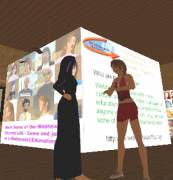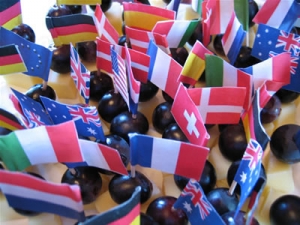It is our birthday today – and we are taking you behind the scenes of absolutely intercultural!
 So because this is our first birthday episode, we are going to be a bit more self-centred then usually.
So because this is our first birthday episode, we are going to be a bit more self-centred then usually.
For the column absolutely nostalgic we’re taking a look back at our very first show. Do you remember? It was about the Tapas culture in Leon, in the north of Spain, and Steve Evans from the British Council in Madrid constructed an English lesson around this show. As he was one of the first teachers who have used our show in the classroom, I decided I should visit him and interview him about it. So I met Steve a while ago and we chatted about the reactions of his students and how our podcast has influenced their way of learning and communicating in the classroom. Please also have a look at the Madrid Young Learners Video Podcast, which they started after listening to our first show.
For our second column absolutely influential Anne, Laurent and I have talked about how our podcast has influenced our own working lives and maybe even our private lives. And right after that we’ll go absolutely indiscrete and take you behind the scenes of absolutely intercultural. Have you ever wondered how we actually produce this podcast and meet all the people for our interviews? Well, your questions will be answered soon. And we’ve got some confessions to make, but that’ll have to wait until later.
And in the end you can learn a little bit more about us, the makers and moderators of absolutely intercultural, if you like.
The next show will be coming to you on the 6th of April from Anne Fox in Denmark.
So long…stay tuned!
The host of this show is: Dr. Laurent Borgmann
Edited and co-hosted by: Karsten Kneese






 Believe it or not – we are
Believe it or not – we are  And this came in last minute: ‘absolutely intercultural!’ has been named a
And this came in last minute: ‘absolutely intercultural!’ has been named a 
